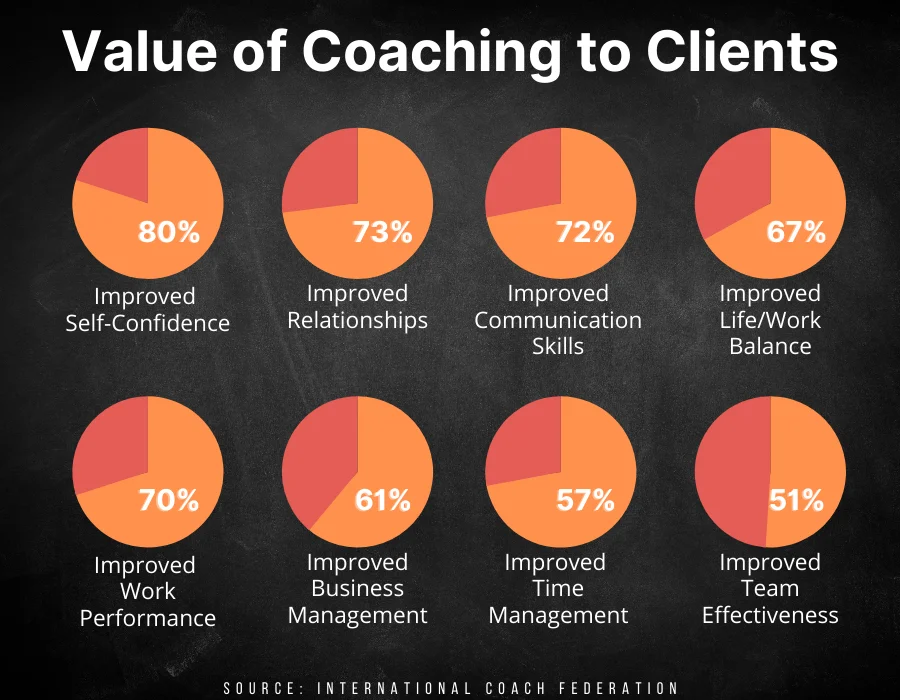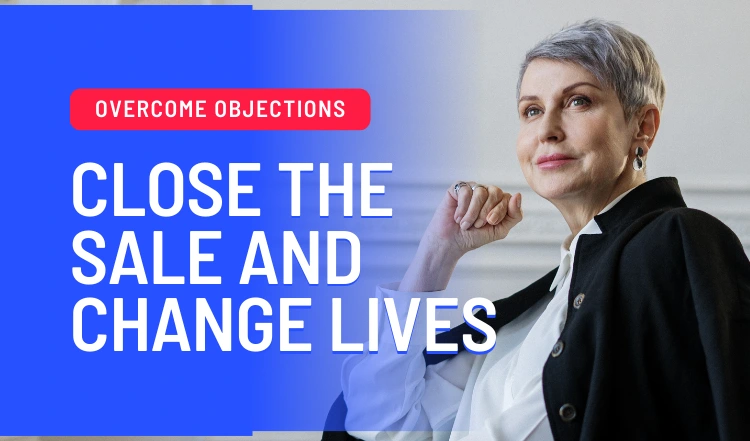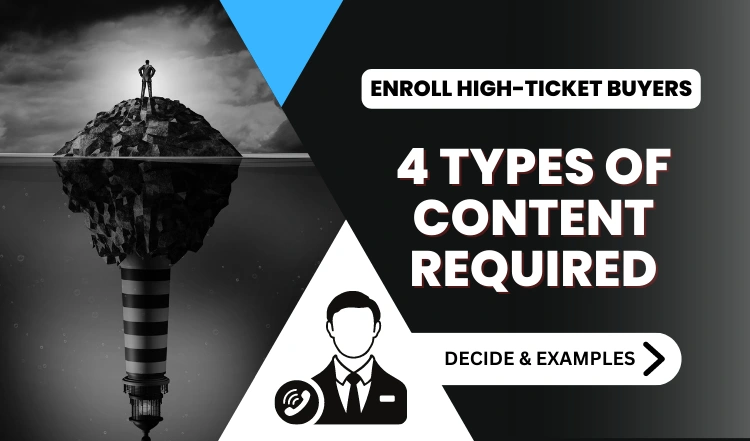Your goal, as a coach, is to guide your potential clients towards their desired outcomes and help them envision the positive changes that your coaching program can bring to their lives.
However, to turn this vision into a reality, you need to close the sale effectively.
Closing a sale is not just about asking for a commitment; it’s about building trust and rapport with your potential client, understanding their needs and challenges, and presenting your coaching program as a solution that can help them overcome their obstacles and achieve their goals.
Remember, you’re not selling a service, you’re offering a solution.
To close a sale successfully, you need to prepare for the sales conversation in advance.
Start by researching your potential client’s background and goals, so you can tailor your coaching program to their specific needs.
During the conversation, listen actively to your potential client’s concerns and objections and address them with empathy and understanding.
This will help build trust and show that you genuinely care about their success.
When presenting your coaching program, focus on the benefits that it can bring to your potential client’s life.
Use specific examples and case studies to illustrate how your coaching has helped other clients achieve their goals. This will help your potential client visualize the positive changes that they can experience through your program.
Finally, when it’s time to ask for a commitment, be clear and direct. Use positive language and avoid any pressure tactics.
Let your potential client know what they can expect from your coaching program and what is required of them to achieve their goals. This will help them make an informed decision and feel confident in their choice to work with you.
Simply put, closing a sale in the coaching niche requires careful preparation, active listening, and effective communication.
By understanding your potential client’s needs and presenting your coaching program as a solution that can help them achieve their goals, you can build trust and close the sale with confidence.

3 Necessary Steps To Close The Sale
1. Acknowledge the current reality of your potential client's life.
The first step in closing a sale successfully is to acknowledge the current reality of your potential client’s life.
This means understanding and empathizing with their struggles, challenges, and pain points. It’s important to take the time to listen actively to your potential client and show genuine interest in their situation.
You must first effectively acknowledge their current reality by putting yourself in their shoes and seeing the world from their perspective. This means suspending any judgment or preconceived notions you may have and truly understanding their unique situation.
When you acknowledge their reality, you are demonstrating that you understand their needs and concerns and are committed to helping them achieve their goals.
For example, if your potential client is struggling with work-life balance, acknowledge the stress and anxiety that they may be feeling as they try to juggle their personal and professional responsibilities.
By acknowledging their reality, you are showing that you understand their pain points and are committed to helping them find a solution.
In order to successfully acknowledge their reality, you must validate their feelings.
Let them know that their struggles are real and that it’s okay to feel overwhelmed or uncertain. This can help build trust and rapport with your potential client and make them feel more comfortable opening up to you.
In summary, acknowledging the current reality of your potential client’s life is an essential first step in closing a sale. By showing empathy and understanding for their struggles, challenges, and pain points, you can build trust and rapport with your potential client and create a strong foundation for a successful coaching relationship.
2. Talk up the results of your coaching.
After acknowledging the current reality of your potential client’s life, the next step is to talk up the results of your coaching program.
To do this effectively, you need to paint a vivid picture of the transformation that can be achieved through your coaching program.
Start by identifying the specific benefits and positive changes that your coaching program can provide.
These could include improved health, increased confidence, greater success, better relationships, or any other outcomes that align with your potential client’s goals and needs.
Once you’ve identified these benefits, you can begin to talk them up in your sales conversation.
When talking up the results, it’s important to be specific and provide real-world examples of how your coaching program has helped other clients achieve their goals.
Share stories and case studies that illustrate the positive changes that your coaching has brought to other people’s lives.
This can help your potential client visualize the transformation that they could experience through working with you.
It’s also important to emphasize the personal growth and empowerment that can come from your coaching program. Talk about how your coaching can help your potential client overcome their obstacles and develop the skills and confidence they need to achieve their goals.
By highlighting the personal transformation that can come from your coaching program, you can inspire your potential clients and make them feel more confident about committing to your program.
In short, talking up the results is a crucial step in closing a sale in the coaching niche. By painting a vivid picture of the positive changes and benefits that your coaching program can provide and using real-world examples and stories to illustrate these points, you can inspire your potential client and help them see the value of working with you.
3. Ask them to invest as they're envisioning these positive changes.
The final step in closing a sale in the coaching niche is to ask the potential client to invest in your coaching program.
Timing is crucial here, as you want to ask for commitment while the potential client is feeling positive and optimistic about the transformation that they can achieve through working with you.
As you talk up the results and paint a vivid picture of the positive changes that your coaching program can bring, be sure to also address any objections or concerns that the potential client may have. This can include concerns about time, money, or other commitments.
By addressing these concerns upfront and providing solutions or alternatives, you can help alleviate any anxiety or hesitation that the potential client may be feeling.
When it comes time to ask for the investment, be clear and confident in your approach. Provide a clear outline of what the coaching program entails, including the time commitment, the cost, and any other details that are relevant.
Be sure to emphasize the value and benefits that the potential client will receive by working with you, and explain how your coaching can help them achieve their specific goals.
Ultimately, the goal is to make it easy for the potential client to say yes. By presenting a clear and compelling case for your coaching program and asking for the investment at the right time, you can increase the chances of a successful sale and a positive outcome for both you and your client.
So, the final step in closing a sale in the coaching niche is to ask the potential client to invest in your coaching program. By timing the ask for commitment while the potential client is feeling positive and optimistic about the transformation that they can achieve through working with you, and addressing any objections or concerns that they may have, you can make it easy for them to say yes and move forward with your coaching program.
Overcome Common Sales Objections

Very few potential clients will immediately jump to your services. In fact, quite a few will offer up a myriad of reasons as to why they can’t.
Don’t worry about it! That’s all part of the sales game.
Here are some common objections that potential clients may raise and some tips on how to address them to overcome them and make the sale:
“I can’t afford it.”
This is one of the most common objections that you may encounter when selling a coaching program.
The best way to address this is to emphasize the value that your coaching program can provide and help the potential client understand the potential return on investment.
You can also offer payment plans or other alternatives to help make the investment more affordable.
“I don’t have time.”
If a potential client is concerned about time commitments, it’s important to emphasize the flexibility and customization of your coaching program.
Show them how your coaching can fit into their schedule and help them achieve their goals without overwhelming their already busy life.
“I’m not sure if it will work for me.”
This objection is often rooted in fear and uncertainty. To overcome it, provide social proof by sharing testimonials, case studies, and success stories from previous clients.
You can also offer a satisfaction guarantee or a free trial to help the potential client feel more confident in their decision.
“I’m not ready to make a commitment.”
If a potential client is hesitant to make a commitment, it’s important to understand their concerns and help them feel more comfortable.
Offer a low-risk trial or a shorter program that can help them get started and see the benefits before making a larger investment.
“I don’t think I need coaching.”
This objection is often based on a lack of understanding of what coaching is and how it can help.
To overcome it, educate the potential client on the benefits of coaching and provide examples of how it has helped others in similar situations.
“I’m not sure if I’m ready for change.”
Sometimes, potential clients may feel hesitant about making changes in their life.
To overcome this objection, emphasize the benefits of stepping outside their comfort zone and provide support and encouragement to help them overcome their fears and achieve their goals.
Objections are a normal part of the sales process and can often be overcome with the right approach.
By understanding the potential client’s concerns and offering solutions and alternatives, you can help them see the value of investing in your coaching program and achieve their goals.
And always remember to make sure your potential client knows that, in reality, they’re investing in themselves and their future when they choose to work with you.





